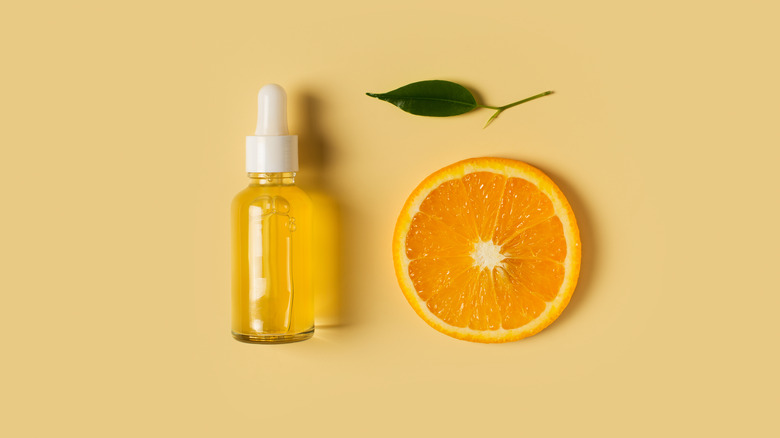Why You Should Be Incorporating Ascorbic Acid Into Your Diet And Beauty Routine
Retinol, cannabidiol, and niacinamide are just a few ingredients you may recognize from your beauty products. Another popular additive is ascorbic acid, but you probably know it by its simper name: vitamin C.
The National Institutes of Health Office of Dietary Supplements (NIH) defines ascorbic acid as "a water-soluble nutrient found in some foods. In the body, it acts as an antioxidant, helping to protect cells from the damage caused by free radicals." Harmful free radicals can be found in pollution, ultraviolet light from the sun, cigarette smoke, and other toxins in the environment. If the word "acid" makes you nervous, the NIH also said that, in supplements, it doesn't matter if vitamin C is in the form of ascorbic acid, sodium ascorbate, calcium ascorbate, or ascorbic acid with bioflavonoids. They all offer similar benefits.
Ascorbic acid isn't only found in creams, oils, and serums. It's also been used in dietary supplements for years. Here's a look at how this nutrient proves to be really good for your skin and body.
Skincare benefits of ascorbic acid
Using skincare products with ascorbic acid can help you maintain a youthful look. Between aging, environmental factors, sun damage, and gravity itself, collagen supply naturally declines over time, per Mindbodygreen Lifestyle — and fine lines and wrinkles are the natural results. One of the biggest benefits of ascorbic acid, according to the National Institutes of Health Office of Dietary Supplements (NIH), is its essential role in the production of collagen. Dermatologist Dr. Ohara Aivaz told Cedars-Sinai that collagen is what keeps us looking young as it prevents sagging in the skin.
In addition, ascorbic acid also helps the skin heal properly. A study by the British Journal of Community Nursing showed that ascorbic acid plays a major role in every phase of wound healing. It's actually required in order to fight inflammation, synthesize collagen, and prevent scarring. The authors even recommend using supplements with ascorbic acid to aid in the healing process.
How your body benefits from ascorbic acid
When it comes to heart health, ascorbic acid is key. Frontiers in Cardiovascular Medicine says that oxidative stress is a major factor in developing heart attacks, strokes, and diseases in the arteries of the heart. Because it's so full of antioxidants, studies are underway to see if ascorbic acid might protect cells that line the blood vessels, though nothing conclusive has been found. A study by Nutrition Journal even found that healthy blood pressure levels particularly in young Black and white women were associated with high ascorbic acid levels.
Brain health also benefits from ascorbic acid. Pharmacological Research, Volume 186 listed ascorbic acid as one of the nutrients used to create neurotransmitters such as dopamine, serotonin, and adrenaline.
Ascorbic acid has been researched in delaying the onset of cataracts, as it can help vitamin E production, according to a review by Nutrients.
Last but not least, ascorbic acid is ideal for immunity. Another study by Nutrients shows that by working with the body on a cellular level, ascorbic acid plays a role in everything from fighting sickness and disease to metabolic energy and hormonal regulation.



